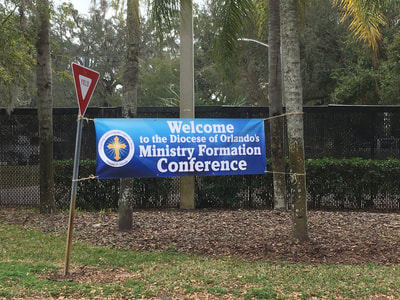|
I had an interesting day yesterday as a presenter at the Diocese of Orlando’s annual Ministry Formation Conference. I posted a few pictures below to prove I actually showed up. This conference is scheduled every September at the beginning of the academic year, but in 2017 the conference coincided with Hurricane Irma, so the event was moved back five months on short notice. It is always difficult to relocate conventions; neither our bishop nor our out-of-town keynote speaker were able to reschedule for the new date. I am told the attendance was down somewhat from the previous year, but I didn’t notice any radical drop off.
You might recall my January 24 post and link to a St. Mary’s Press study, Going, Going, Gone: The Dynamics of Disaffiliation in Young Catholics and the link to the Minnesota Public Radio forum on the study. As luck would have it, St. Mary’s Press was an exhibitor at the conference, and I had a long conversation with the representative on site who had attended the Minnesota forum. I said that I was pleasantly surprised to see a Catholic publisher spend so much money for a study of this scope. She said that the study was done as part of a visioning process [my term] to determine the future needs of catechetics, in terms of publishing, approach, and targeted audiences. She will be passing on more useful links for our use here, but I sincerely hope that the data being mined is taken seriously in the broader Church community. Catechetics has at its heart a rich content, and I always hope that its ministers—including me—are strong on both flanks, the giving and receiving. By “giving” I mean a growing acquaintance with the underlying mystery and essence of Christian life to the degree we can deliver this message well. The “receiving” is respect for the students and what they bring to the table—which admittedly comes at times in the form of critique, tortured questions, and even disaffiliation [as in the St. Mary study.] I always carry this thought into gatherings such as these. It is hard to do ministry today, and I carry the suspicion that the Catholic educational system is not quite sure how to do it. I did not attend other workshops yesterday, although I did attend the keynote address—a rather clerical boxcar of generic nouns with neither concrete explanation nor specific implementation. My fear is that religious instruction—and homiletics! —too often hides behind safe generics. An example? As you might expect, there was much mention yesterday of the Church’s mission to the family. You’ve heard it: the Christian family is the backbone of society. The standard treatment in textbooks and presentations is repetitive and again generic. One phrase I hear and read is the description of marriage as a “total giving of the self to the other.” Because the phrase is rarely teased out into specifics in school or church, I guess that what we have here is a metaphor for the sacrifices we make on behalf of our spouses and our children. As it stands literally, though, it sounds like a recipe for domestic violence. One does not lose himself in any relationship. Many wise women have raised that with me in recent years, and they have a good point. If our catechetics is limited to the slogan that marriage is very important in the eyes of God, there better be a great deal more specificity about families, on a multidisciplinary platform. To carry through the thought, I saw the tweet from a congressman yesterday regarding the secretary who, with the new tax reform, is now receiving $1.60 more in her paycheck—enough, she said, “to pay for her annual Costco membership.” There is something instinctively objective to such a state of affairs, that in a country of plenty so many of its citizens live on the razor’s edge, fiscally speaking, while others define this as civic virtue. You have to wonder when a hard-working parent, for example, who might be holding down two jobs, has the time and energy to do what we catechize them to do, i.e., weekly Mass, study of Scripture, home formation of the faith, the local works of mercy, adult education, etc. Is quality Christian family life possible for low to middle class families? This is the “hard work” of catechists and anyone who ministers in the Church, right up to the bishops, integrating belief with the possible, and decrying where necessary the roadblocks to the conditions of individual and family life that our Church documents—not to mention our nation’s founding wisdom—call forth as basic human rights before God. Again, I can only hope that some such explicit examination of the dynamic of catechetics took place yesterday in the various workshops on the menu. My own class was “Church History,” built around material I am researching for Thursday’s Reformation posts. I was pleased at the input of the participants on a number of late medieval matters with significant impact today: the treatment of Jews during the Great Plague of 1347 and anti-Semitism today, the perpetual search for scapegoats; and the “democratization of the Bible” advocated by the fourteenth-century English reformer John Wycliffe, stressing the right to read the Bible in one’s own native tongue and to form personal conscience from such reading and mysticism. This was a class I would have loved to haul down to a local alehouse for more catechetical reflection. Unfortunately, that was not possible, but it was a good note to conclude with. And so, we press on.
0 Comments
Leave a Reply. |
On My Mind. Archives
July 2024
|





 RSS Feed
RSS Feed